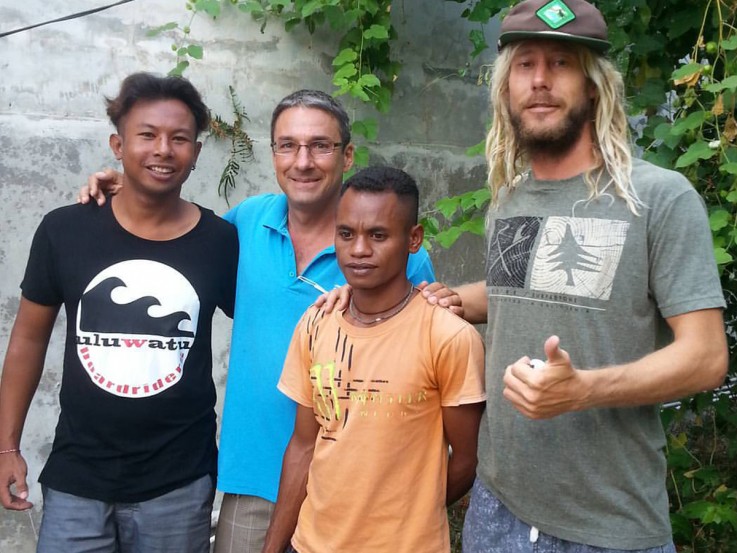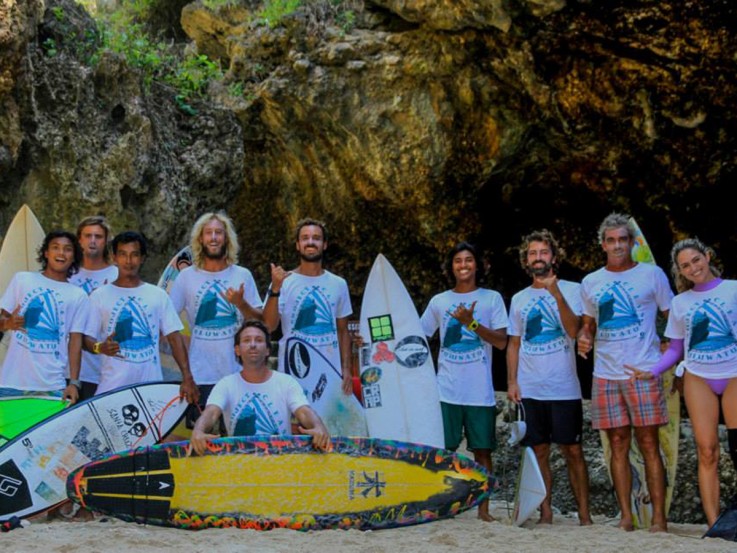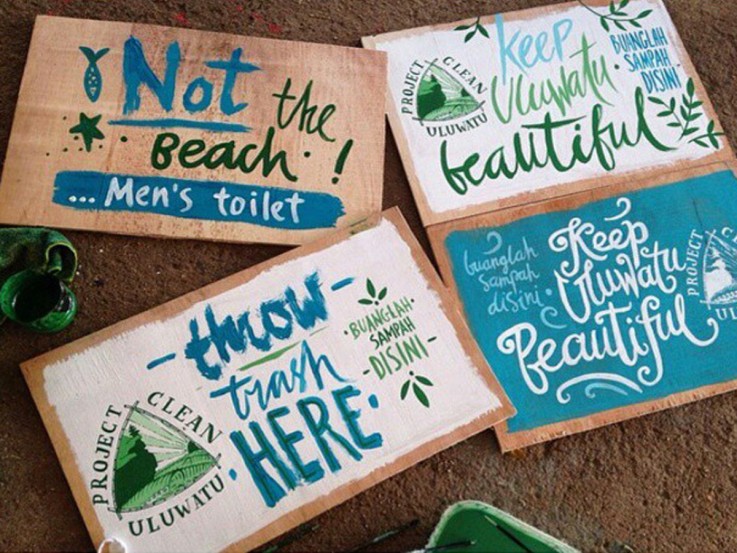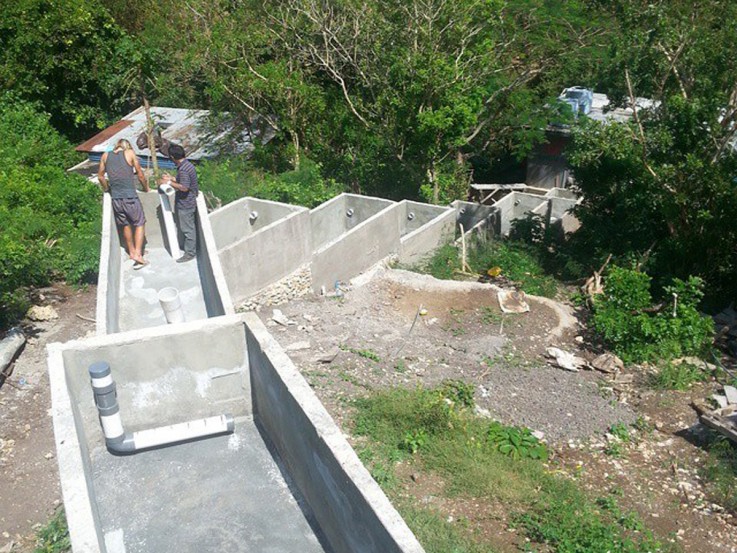Project Clean Uluwatu
Wasting no effort in addressing environmental issues
As a surfing destination Uluwatu, Bali first came to light in 1972 thanks to the iconic surf-flick Morning of the Earth. The discovery of the world-class wave enticed surfers from around the world and Uluwatu was coined a surfing mecca. The developers quickly followed and the next 40 years witnessed an explosion in commercial development to accommodate the growing swell of surfers.
Sadly there was never adequate planning to support the growth and without the right infrastructure, practices or policies in place, Uluwatu faced major environmental issues. In 2011, concerned local residents took steps to address the dire situation but received little cooperation and support and, as a result Project Clean Uluwatu (PCU) was formed.
PCU committee member, and founder of Uluwatu Surf Villas, Tim Russo was involved in the set-up of the project alongside local residents Jon Huberman and Ollie Crowell. Tim says everyone saw the problem and it was becoming unbearable - to the point where action was needed to try and find solutions.
“Having lived in Uluwatu since arriving in Bali, I felt like this was something important that I needed to get involved in. PCU provides structure for ex pats and concerned locals to protect and care for the beach at Uluwatu,” he says.
The first task to tackle was the dry waste. PCU initiated a massive clean up resulting in the removal of 30 tonnes of rubbish - a huge volunteer effort, which took place over several weeks. From there, the team implemented a daily dry waste collection and removal process.
Next step was addressing the liquid waste problem that had arisen due to the absence of proper waste systems installed as warungs (local restaurants) were built. PCU engaged specialist engineers to assess the problem and subsequently built a bioseptic system to treat the water.
“We spent three years in the process of raising money, making progress, raising money, making progress. In the first year we treated about 1.6 million litres of wastewater and today, we treat about two million litres each year. We gauge and track the liquid waste but most importantly, prevent it going into the line up,” Tim says.
Two committees comprise the team – the PCU committee and the local Warung committee. They meet every six months, or as needed, to seek approvals or engagement. Tim says dealing with waste issues is not a simple one. He credits the achievements of PCU to the continued and concerted efforts of committee members and volunteers headed up by Project Manager Curtis Lowe.
“People just want it [waste] out of sight, out of mind. We’ve had to work really hard to find solutions that everyone supports. We’re very open and want to share everything we’ve learned. Once the project is complete we plan to set up a template that others can use to replicate what we’ve done. But at the end of the day all the work comes down to individuals.”
PCU’s mission is to create a successful case study that can be replicated in other environmentally troubled surf areas in Indonesia.
“We’ve had a lot of people trying to get us involved in other water projects and while it’s tempting to look at doing this at other beaches we don’t feel we’re done at Uluwatu. There’s going to be a lot of development here so we need to stay focused on protecting Uluwatu, and that’s a big job.”
Tim believes surfers should play a much bigger role in sustainability and in fulfilling their role as global caretakers of the ocean. “A lot of surfers take the ocean for granted. Uluwatu would be in dire straights if it wasn’t cleaned up in the time frame that it was. Surfers need to wake up - no one spends more time in the ocean than surfers, so if we don’t care, who will?”
Tim believes surfers should play a much bigger role in sustainability and in fulfilling their role as global caretakers of the ocean
PCU are solely reliant on donations, fundraising and volunteering to maintain their work. An intern program is also on offer for anyone who’s serious about getting involved. This can encompass anything from planting gardens around the warungs, spray painting trashcans or tackling what Curtis describes as one of the gnarliest jobs in the world; cleaning the grease traps. For more information on how you can support PCU check out their website or jump onto the PCU Facebook page.
Some impressive stats…
- 1,500 cubic meters of trash has been removed since June of 2011
- Three cubic litres of waste water is removed per day
- The waste water produces two cubic meters of organic compost per month
- More than 2 million litres of waste water (that would have gone straight into the ocean) has been removed to date
Surfers Charging for Change Series
This article is the fourth in a series that we are penning, which highlights some of the leaders in sustainable surfing practices and showcases the inspiring efforts of surfers around the globe tackling issues including; the eradication of plastics, clean water, empowerment through education and enabling greater access for surfers with disabilities, just to name a few. Stay tuned for the next instalment...
Surfers Charging for Change - Introduction
Surfers Charging for Change - Combating the Plastics Problem in Indonesia
Surfers Charging for Change - Boomerang Bags
Posted by: Jaclyn Knight, on December 13, 2015
Categories: Articles
Latest Posts
Craig Sims - White Horses & Surfing Life Publisher
Luke Kennedy - Editor of Tracks Magazine
Simon ‘Swilly’ Williams - Surf Photographer
Jarra Campbell - the Bondi Alchemist
Greg Gordon - Owner of CR Surf
Shayne Nienaber - Surf Photographer
Alexa Hohenberg - Owner of Still Stoked
Christine Deveney - TapaReef Owner & Creator
Russell Ord - Surf Photographer
Richard Kotch - Surf Photographer
Categories
Interviews
Articles
Videos
Press Releases
Quiz
Archive
December 2018
November 2018
October 2018
September 2018
August 2018
July 2018
June 2018
May 2018
April 2018
March 2018
February 2018
January 2018
November 2017
January 2017
December 2016
November 2016
October 2016
September 2016
August 2016
July 2016
June 2016
May 2016
April 2016
March 2016
February 2016
January 2016
December 2015
November 2015
October 2015
September 2015
August 2015
July 2015
June 2015
May 2015
April 2015
March 2015
February 2015
January 2015
December 2014
November 2014
October 2014
September 2014
August 2014
July 2014
June 2014
May 2014
April 2014
March 2014
February 2014
January 2014
December 2013
November 2013
October 2013
September 2013
August 2013
July 2013
June 2013
May 2013
April 2013
March 2013












